Thomas James Richards, Diaries, Transcript Vol. 1, 26 August 1914 to 24 April 1915 - Part 11
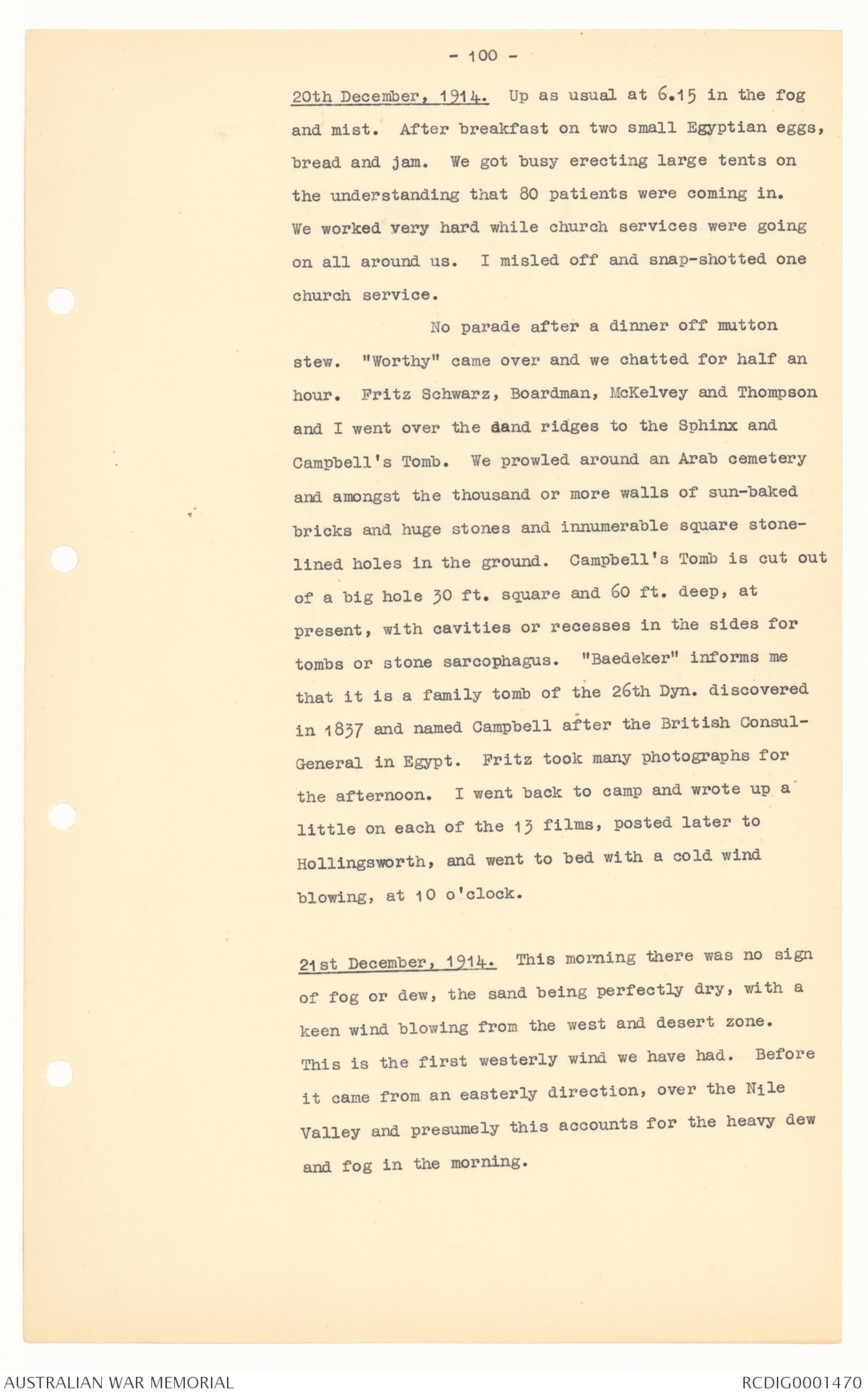
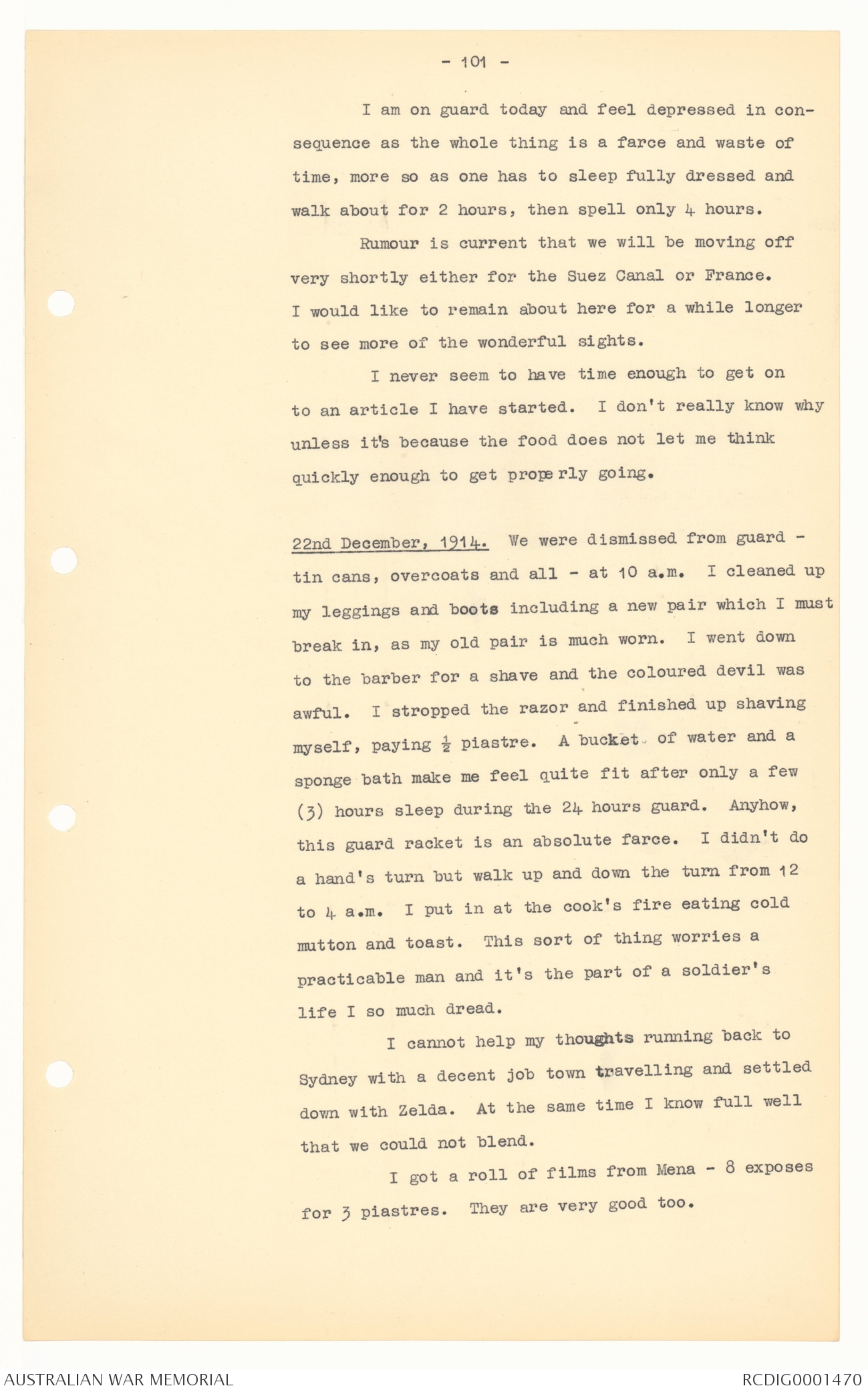
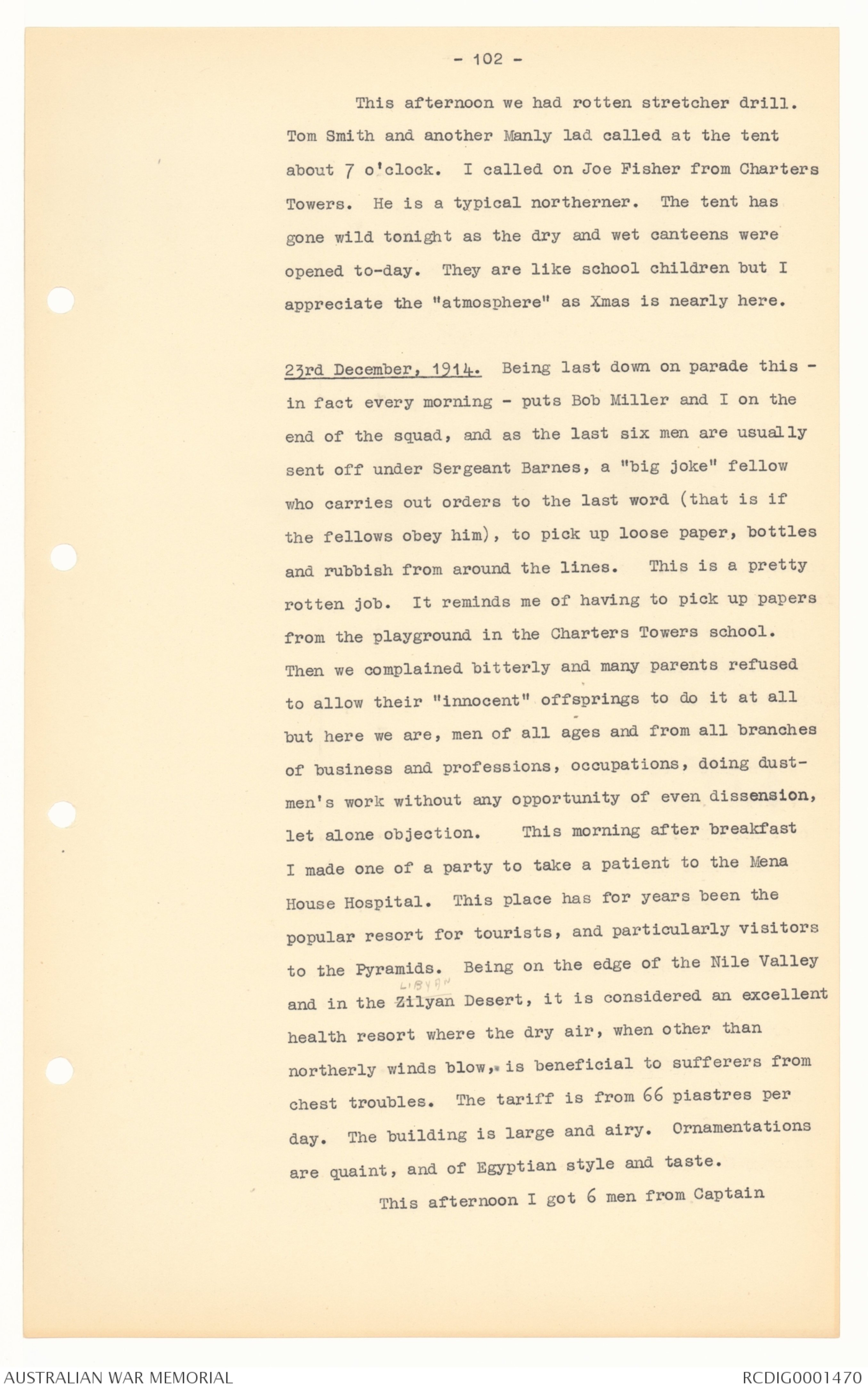
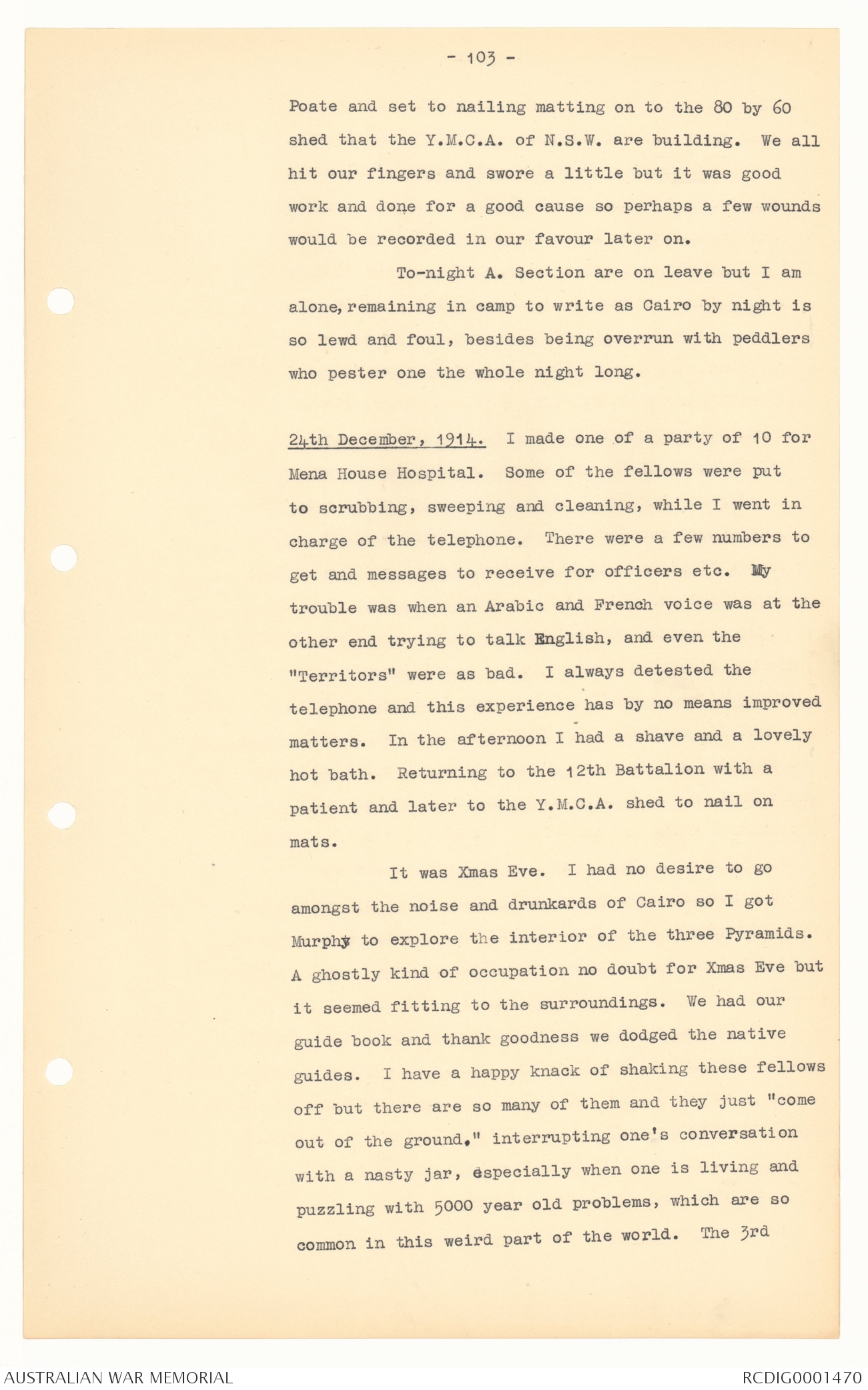
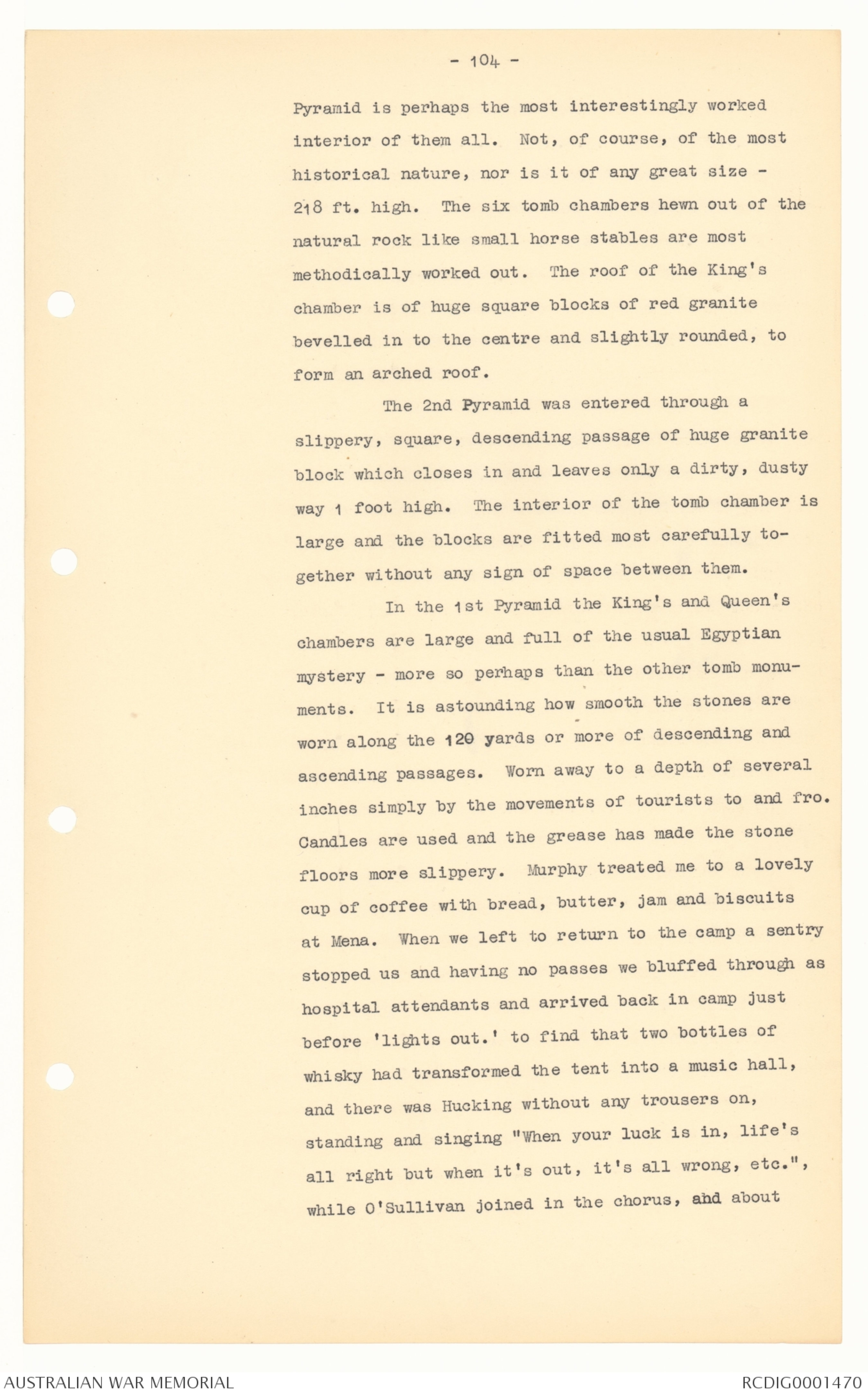
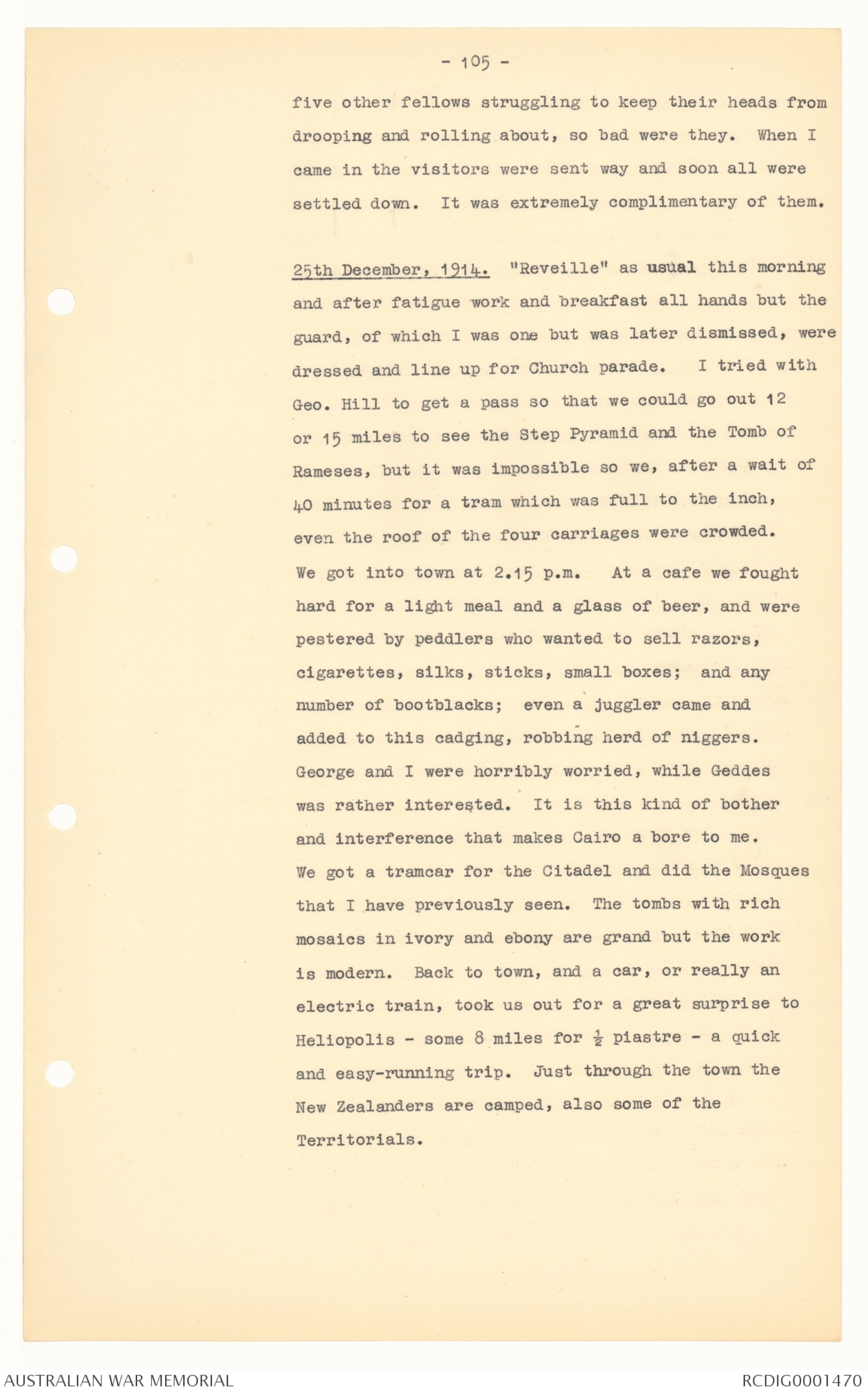
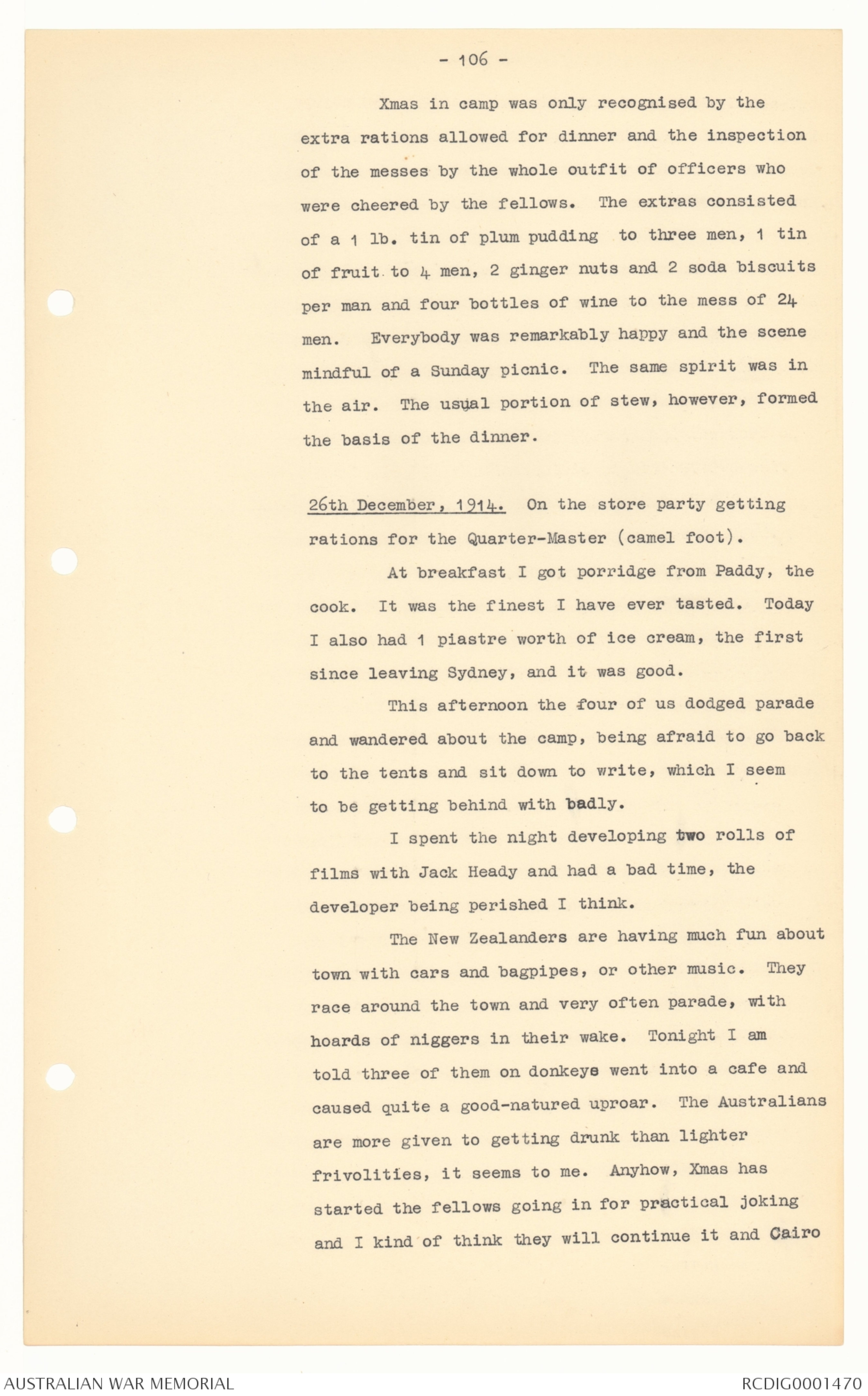
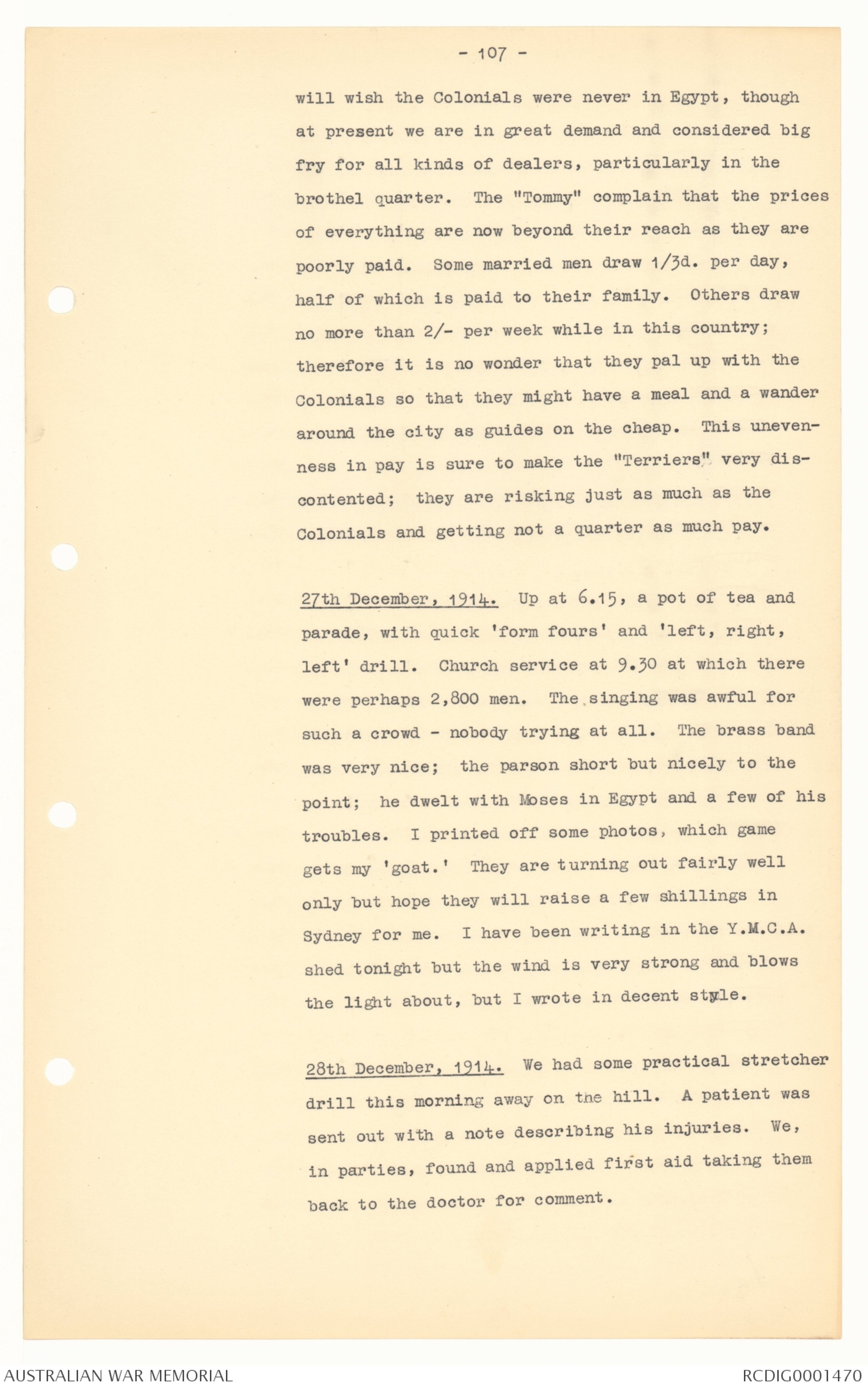
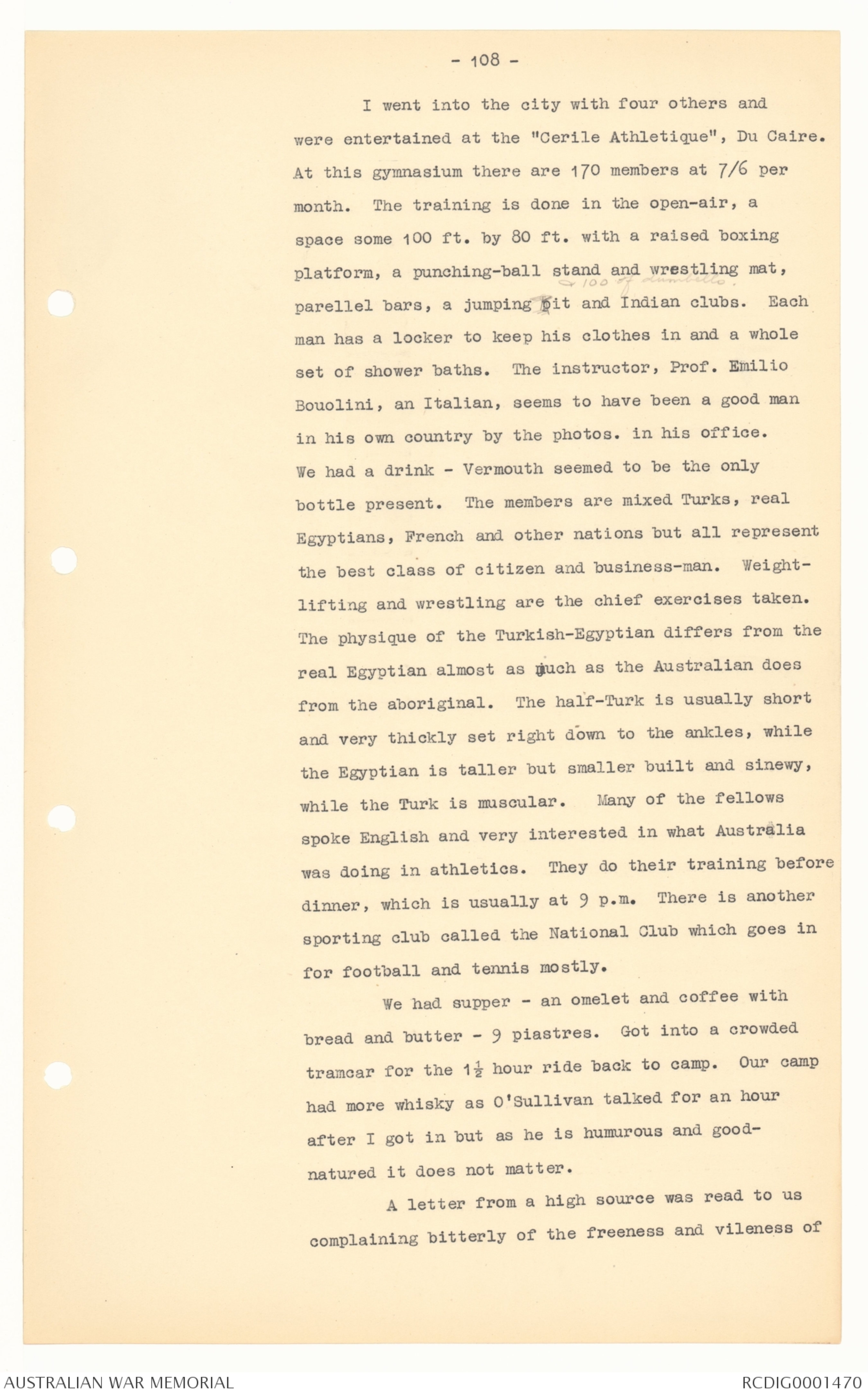
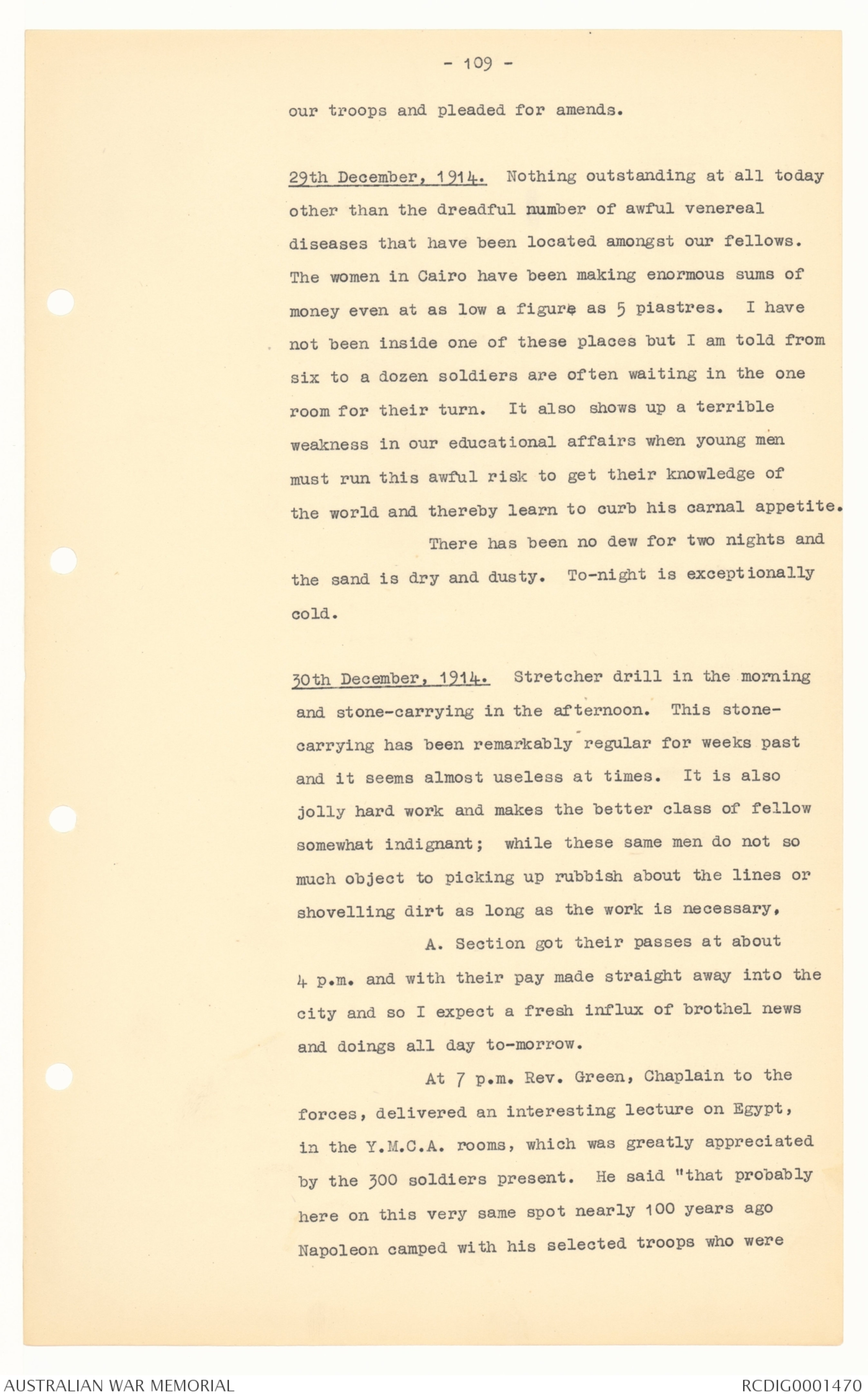
-100-
20th December, 1914. Up as usual at 6.15 in the fog
and mist. After breakfast on two small Egyptian eggs,
bread and jam. We got busy erecting large tents on
the understanding that 80 patients were coming in.
We worked very hard while church services were going
on all around us. I misled off and snap-shotted one
church service.
No parade after a dinner off mutton
stew. "Worthy" came over and we chatted for half an
hour. Fritz Schwarz, Boardman, McKelvey and Thompson
and I went over the sand ridges to the Sphinx and
Campbell's Tomb. We prowled around an Arab cemetery
and amongst the thousand or more walls of sun-baked
bricks and huge stones and innumerable square stone-lined
holes in the ground. Campbell's Tomb is cut out
of a big hole 30 ft. square and 60 ft. deep, at
present, with cavities or recesses in the sides for
tombs or stone sarcophagus. "Baedeker" informs me
that it is a family tomb of the 26th Dyn. discovered
in 1837 and named Campbell after the British Consul-General
in Egypt. Fritz took many photographs for
the afternoon. I went back to camp and wrote up a
little on each of the 13 films, posted later to
Hollingsworth, and went to bed with a cold wind
blowing, at 10 o'clock.
21st December, 1914. This morning there was no sign
of fog or dew, the sand being perfectly dry, with a
keen wind blowing from the west and desert zone.
This is the first westerly wind we have had. Before
it came from an easterly direction, over the Nile
Valley and presumely this accounts for the heavy dew
and fog in the morning.
-101-
I am on guard today and feel depressed in consequence
as the whole thing is a farce and waste of
time, more so as one has to sleep fully dressed and
walk about for 2 hours, then spell only 4 hours.
Rumour is current that we will be moving off
very shortly either for the Suez Canal or France.
I would like to remain about here for a while longer
to see more of the wonderful sights.
I never seem to have time enough to get on
to an article I have started. I don’t really know why
unless its because the food does not let me think
quickly enough to get properly going.
22nd December, 1914. We were dismissed from guard -
tin cans, overcoats and all - at 10 a.m. I cleaned up
my leggings and boots including a new pair which I must
break in, as my old pair is much worn. I went down
to the barber for a shave and the coloured devil was
awful. I stropped the razor and finished up shaving
myself, paying ½ piastre. A bucket, of water and a
sponge bath make me feel quite fit after only a few
(3) hours sleep during the 24 hours guard. Anyhow,
this guard racket is an absolute farce. I didn’t do
a hand's turn but walk up and down the turn from 12
to 4 a.m. I put in at the cook's fire eating cold
mutton and toast. This sort of thing worries a
practicable man and it's the part of a soldier's
life I so much dread.
I cannot help my thoughts running back to
Sydney with a decent job town travelling and settled
down with Zelda. At the same time I know full well
that we could not blend.
I got a roll of films from Mena - 8 exposes
for 3 piastres. They are very good too.
-102-
This afternoon we had rotten stretcher drill.
Tom Smith and another Manly lad called at the tent
about 7 o'clock. I called on Joe Fisher from Charters
Towers. He is a typical northerner. The tent has
gone wild tonight as the dry and wet canteens were
opened to-day. They are like school children but I
appreciate the "atmosphere" as Xmas is nearly here.
23rd December, 1914. Being last down on parade this -
in fact every morning - puts Bob Miller and I on the
end of the squad, and as the last six men are usually
sent off under Sergeant Barnes, a "big joke" fellow
who carries out orders to the last word (that is if
the fellows obey him), to pick up loose paper, bottles
and rubbish from around the lines. This is a pretty
rotten job. It reminds me of having to pick up papers
from the playground in the Charters Towers school.
Then we complained bitterly and many parents refused
to allow their "innocent" offsprings to do it at all
but here we are, men of all ages and from all branches
of business and professions, occupations, doing dustmen's
work without any opportunity of even dissension,
let alone objection. This morning after breakfast
I made one of a party to take a patient to the Mena
House Hospital. This place has for years been the
popular resort for tourists, and particularly visitors
to the Pyramids. Being on the edge of the Nile Valley
and in the Zilyan ^LIBYAN Desert, it is considered an excellent
health resort where the dry air, when other than
northerly winds blow, is beneficial to sufferers from
chest troubles. The tariff is from 66 piastres per
day. The building is large and airy. Ornamentations
are quaint, and of Egyptian style and taste.
This afternoon I got 6 men from Captain
-103-
Poate and set to nailing matting on to the 80 by 60
shed that the Y.M.C.A. of N.S.W. are building. We all
hit our fingers and swore a little but it was good
work and done for a good cause so perhaps a few wounds
would be recorded in our favour later on.
To-night A. Section are on leave but I am
alone, remaining in camp to write as Cairo by night is
so lewd and foul, besides being overrun with peddlers
who pester one the whole night long.
24th December, 1914. I made one of a party of 10 for
Mena House Hospital. Some of the fellows were put
to scrubbing, sweeping and cleaning, while I went in
charge of the telephone. There were a few numbers to
get and messages to receive for officers etc. My
trouble was when an Arabic and French voice was at the
other end trying to talk English, and even the
"Territors" were as bad. I always detested the
telephone and this experience has by no means improved
matters. In the afternoon I had a shave and a lovely
hot bath. Returning to the 12th Battalion with a
patient and later to the Y.M.C.A. shed to nail on
mats.
It was Xmas Eve. I had no desire to go
amongst the noise and drunkards of Cairo so I got
Murphy to explore the interior of the three Pyramids.
A ghostly kind of occupation no doubt for Xmas Eve but
it seemed fitting to the surroundings. We had our
guide book and thank goodness we dodged the native
guides. I have a happy knack of shaking these fellows
off but there are so many of them and they just "come
out of the ground." interrupting one's conversation
with a nasty jar, especially when one is living and
puzzling with 5000 year old problems, which are so
common in this weird part of the world. The 3rd
-104-
Pyramid is perhaps the most interestingly worked
interior of them all. Not, of course, of the most
historical nature, nor is it of any great size -
218 ft. high. The six tomb chambers hewn out of the
natural rock like small horse stables are most
methodically worked out. The roof of the King's
chamber is of huge square blocks of red granite
bevelled in to the centre and slightly rounded, to
form an arched roof.
The 2nd Pyramid was entered through a
slippery, square, descending passage of huge granite
block which closes in and leaves only a dirty, dusty
way 1 foot high. The interior of the tomb chamber is
large and the blocks are fitted most carefully together
without any sign of space between them.
In the 1st Pyramid the King's and Queen's
chambers are large and full of the usual Egyptian
mystery - more so perhaps than the other tomb monuments.
It is astounding how smooth the stones are
worn along the 120 yards or more of descending and
ascending passages. Worn away to a depth of several
inches simply by the movements of tourists to and fro.
Candles are used and the grease has made the stone
floors more slippery. Murphy treated me to a lovely
cup of coffee with bread, butter, jam and biscuits
at Mena. When we left to return to the camp a sentry
stopped us and having no passes we bluffed through as
hospital attendants and arrived back in camp just
before 'lights out.' to find that two bottles of
whisky had transformed the tent into a music hall,
and there was Hucking without any trousers on,
standing and singing "When your luck is in, life's
all right but when it's out, it's all wrong, etc.",
while O'Sullivan joined in the chorus, and about
-105-
five other fellows struggling to keep their heads from
drooping and rolling about, so bad were they. When I
came in the visitors were sent way and soon all were
settled down. It was extremely complimentary of them.
25th December, 1914. "Reveille" as usual this morning
and after fatigue work and breakfast all hands but the
guard, of which I was one but was later dismissed, were
dressed and line up for Church parade. I tried with
Geo. Hill to get a pass so that we could go out 12
or 15 miles to see the Step Pyramid and the Tomb of
Rameses, but it was impossible so we, after a wait of
40 minutes for a tram which was full to the inch,
even the roof of the four carriages were crowded.
We got into town at 2.15 p.m. At a cafe we fought
hard for a light meal and a glass of beer, and were
pestered by peddlers who wanted to sell razors,
cigarettes, silks, sticks, small boxes; and any
number of bootblacks; even a juggler came and
added to this cadging, robbing herd of niggers.
George and I were horribly worried, while Geddes
was rather interested. It is this kind of bother
and interference that makes Cairo a bore to me.
We got a tramcar for the Citadel and did the Mosques
that I have previously seen. The tombs with rich
mosaics in ivory and ebony are grand but the work
is modern. Back to town, and a car, or really an
electric train, took us out for a great surprise to
Heliopolis - some 8 miles for ½ piastre - a quick
and easy-running trip. Just through the town the
New Zealanders are camped, also some of the
Territorials.
-106-
Xmas in camp was only recognised by the
extra rations allowed for dinner and the inspection
of the messes by the whole outfit of officers who
were cheered by the fellows. The extras consisted
of a 1 lb. tin of plum pudding to three men, 1 tin
of fruit to 4 men, 2 ginger nuts and 2 soda biscuits
per man and four bottles of wine to the mess of 24
men. Everybody was remarkably happy and the scene
mindful of a Sunday picnic. The same spirit was in
the air. The usual portion of stew, however, formed
the basis of the dinner.
26th December, 1914. On the store party getting
rations for the Quarter-Master (camel foot).
At breakfast I got porridge from Paddy, the
cook. It was the finest I have ever tasted. Today
I also had 1 piastre worth of ice cream, the first
since leaving Sydney, and it was good.
This afternoon the four of us dodged parade
and wandered about the camp, being afraid to go back
to the tents and sit down to write, which I seem
to be getting behind with badly.
I spent the night developing two rolls of
films with Jack Heady and had a bad time, the
developer being perished I think.
The New Zealanders are having much fun about
town with cars and bagpipes, or other music. They
race around the town and very often parade, with
hoards of niggers in their wake. Tonight I am
told three of them on donkeys went into a cafe and
caused quite a good-natured uproar. The Australians
are more given to getting drunk than lighter
frivolities, it seems to me. Anyhow, Xmas has
started the fellows going in for practical joking
and I kind of think they will continue it and Cairo
-107-
will wish the Colonials were never in Egypt, though
at present we are in great demand and considered big
fry for all kinds of dealers, particularly in the
brothel quarter. The "Tommy" complain that the prices
of everything are now beyond their reach as they are
poorly paid. Some married men draw 1/3d. per day,
half of which is paid to their family. Others draw
no more than 2/- per week while in this country;
therefore it is no wonder that they pal up with the
Colonials so that they might have a meal and a wander
around the city as guides on the cheap. This unevenness
in pay is sure to make the "Terriers" very discontented;
they are risking just as much as the
Colonials and getting not a quarter as much pay.
27th December, 1914. Up at 6.15, a pot of tea and
parade, with quick 'form fours' and 'left, right,
left' drill. Church service at 9.30 at which there
were perhaps 2,800 men. The singing was awful for
such a crowd - nobody trying at all. The brass band
was very nice; the parson short but nicely to the
point; he dwelt with Moses in Egypt and a few of his
troubles. I printed off some photos, which game
gets my 'goat.' They are turning out fairly well
only but hope they will raise a few shillings in
Sydney for me. I have been writing in the Y.M.C.A.
shed tonight but the wind is very strong and blows
the light about, but I wrote in decent style.
28th December, 1914. We had some practical stretcher
drill this morning away on the hill. A patient was
sent out with a note describing his injuries. We,
in parties, found and applied first aid taking them
back to the doctor for comment.
-108-
I went into the city with four others and
were entertained at the "Cerile Athletique", Du Caire.
At this gymnasium there are 170 members at 7/6 per
month. The training is done in the open-air, a
space some 100 ft. by 80 ft. with a raised boxing
platform, a punching-ball stand and wrestling mat,
parellel bars, a jumping pit ^& 100 of dumbells. and Indian clubs. Each
man has a locker to keep his clothes in and a whole
set of shower baths. The instructor, Prof. Emilio
Bouolini, an Italian, seems to have been a good man
in his own country by the photos. in his office.
We had a drink - Vermouth seemed to be the only
bottle present. The members are mixed Turks, real
Egyptians, French and other nations but all represent
the best class of citizen and business-man. Weight-lifting
and wrestling are the chief exercises taken.
The physique of the Turkish-Egyptian differs from the
real Egyptian almost as much as the Australian does
from the aboriginal. The half-Turk is usually short
and very thickly set right down to the ankles, while
the Egyptian is taller but smaller built and sinewy,
while the Turk is muscular. Many of the fellows
spoke English and very interested in what Australia
was doing in athletics. They do their training before
dinner, which is usually at 9 p.m. There is another
sporting club called the National Club which goes in
for football and tennis mostly.
We had supper - an omelet and coffee with
bread and butter - 9 piastres. Got into a crowded
tramcar for the 1½ hour ride back to camp. Our camp
had more whisky as O'Sullivan talked for an hour
after I got in but as he is humurous and good-natured
it does not matter.
A letter from a high source was read to us
complaining bitterly of the freeness and vileness of
-109-
our troops and pleaded for amends.
29th December, 1914. Nothing outstanding at all today
other than the dreadful number of awful venereal
diseases that have been located amongst our fellows.
The women in Cairo have been making enormous sums of
money even at as low a figure as 5 piastres. I have
not been inside one of these places but I am told from
six to a dozen soldiers are often waiting in the one
room for their turn. It also shows up a terrible
weakness in our educational affairs when young men
must run this awful risk to get their knowledge of
the world and thereby learn to curb his carnal appetite.
There has been no dew for two nights and
the sand is dry and dusty. To-night is exceptionally
cold.
30th December, 1914. Stretcher drill in the morning
and stone-carrying in the afternoon. This stone-carrying
has been remarkably regular for weeks past
and it seems almost useless at times. It is also
jolly hard work and makes the better class of fellow
somewhat indignant; while these same men do not so
much object to picking up rubbish about the lines or
shovelling dirt as long as the work is necessary.
A. Section got their passes at about
4 p.m. and with their pay made straight away into the
city and so I expect a fresh influx of brothel news
and doings all day to-morrow.
At 7 p.m. Rev. Green, Chaplain to the
forces, delivered an interesting lecture on Egypt,
in the Y.M.C.A. rooms, which was greatly appreciated
by the 300 soldiers present. He said "that probably
here on this very same spot nearly 100 years ago
Napoleon camped with his selected troops who were
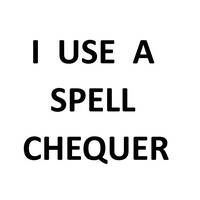 Not Yet Replaced By AI
Not Yet Replaced By AIThis transcription item is now locked to you for editing. To release the lock either Save your changes or Cancel.
This lock will be automatically released after 60 minutes of inactivity.